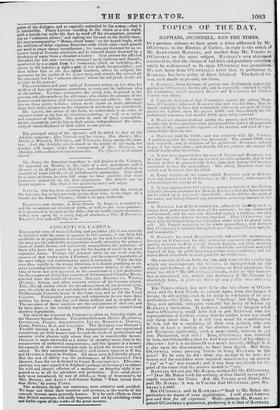CONCERTI DA CAMERA.
THE general state of musical feeling and prejudice (for it can scarcely be dignified with the name of opinion) in this country, is any thing but creditable to its population or encouraging to the real lover of the art ; the most puerile and fi:eble compositions usually obtaining the greatest share of public favour, and exclusively monopolizing the patronage of those who have the power to pay for the luxury of music in its most expensive forms. Perhaps the severest satire on our taste was the success of that trashy opera I Paritani, and the especial popularity of the most vulgar and commonplace piece it contained. While the tide runs thus rapidly in the wrong direction, it is doubly gratifying to ob- serve occasional indications of an under-current flowing in the right. One of these has just appeared, in the association of a few professors for the purpose of giving four concerts of Instrumental Chamber Music, selected from the works of HAYDN, MOZART, BEETHOVEN, WEBER, Hummer., SPOHR, and other eminent writers of the German school. This, like all similar efforts for the advancement of our musical taste, owes its origin to the zeal and industry of individual professors. The Philharmonic Concerts began in the same way, and so did the Vocal Concerts. Fashionable patronage and aristocratic favour have done nothing for them : they live and thrive without and in despite of it. The members of these societies are the real patrons of their art, and by them alone is the musical reputation of our country rescued from absolute degradation. The first of the Concerti da Camera was given on Saturday night, at the Hanover Square Rooms. The perfortiers were Messrs. BtaGnove, GRIESBACH, PIGOTT, SHERRINGTON, LUCAS, BANNISTER, HOWELL, CARD, POWELL, RAE, and SA LAMON. The first piece was ONSLOW'S Twelfth Quintet in A minor. The compositions of our expatriated countryman are little known here beyond the circle of professional and amateur violin players, with whom they are in considerable favour. ONSLOW is more successful as a writer of chamber music than in the construction of orchestral compositions; and this Quintet is a beauti- ful example of the conversational style to which the former is so well suited. To this succeeded MOZART'S well-known Quartet in E flat, and HUMMEL'S, Septet in D minor. All these were delightfully played. But the test of ability was the performance of BEE ElIOVEN'S First Quartet, from the set dedicated to Count BA SOUMOFFSK Y. This com- position was once regarded in England (perhaps in Germany) as almost the wild and chaotic effusion of a madman : on Saturday night it ap- peared to us in all its splendour and perfection. Two vocal pieces only were introduced, by way of relief,—a Song of SCHUBERT'S, by Mrs. BISHOP; and ARNE'S well-known Ballad, "When forced from dear Hebe," by young PARRY. The audience, though not numerous, were attentive and gratified. We hope and think their numbers will increase, as the merits of the concerts become more generally known. It is by such efforts as these that Bnnsh musicians will really improve, and not by exhibiting crude and feeble copies of the works of the great masters.


























 Previous page
Previous page